Unit 4 I used to be afraid of the dark 核心考点精讲精练 课件(共45张PPT)
文档属性
| 名称 | Unit 4 I used to be afraid of the dark 核心考点精讲精练 课件(共45张PPT) | 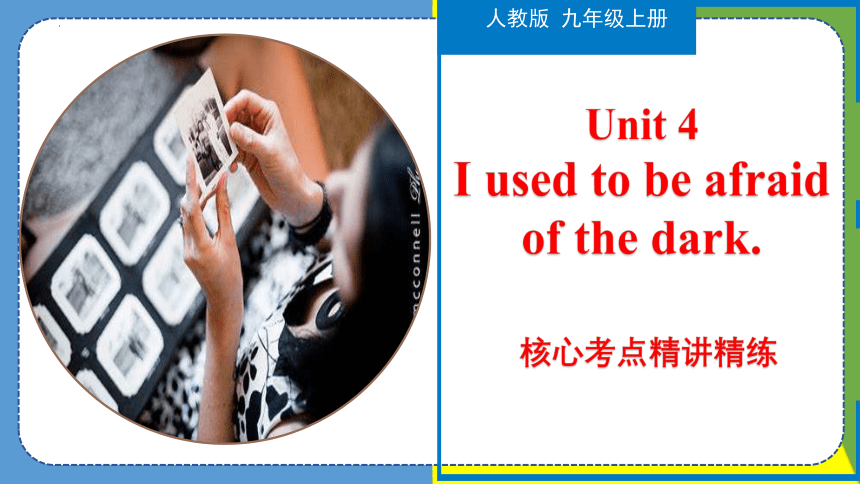 | |
| 格式 | pptx | ||
| 文件大小 | 1.3MB | ||
| 资源类型 | 教案 | ||
| 版本资源 | 人教新目标(Go for it)版 | ||
| 科目 | 英语 | ||
| 更新时间 | 2023-09-19 18:09:02 | ||
图片预览

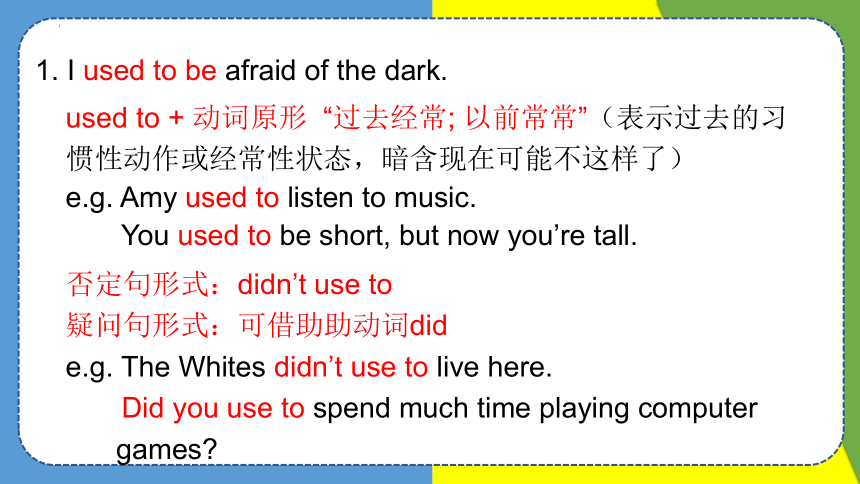
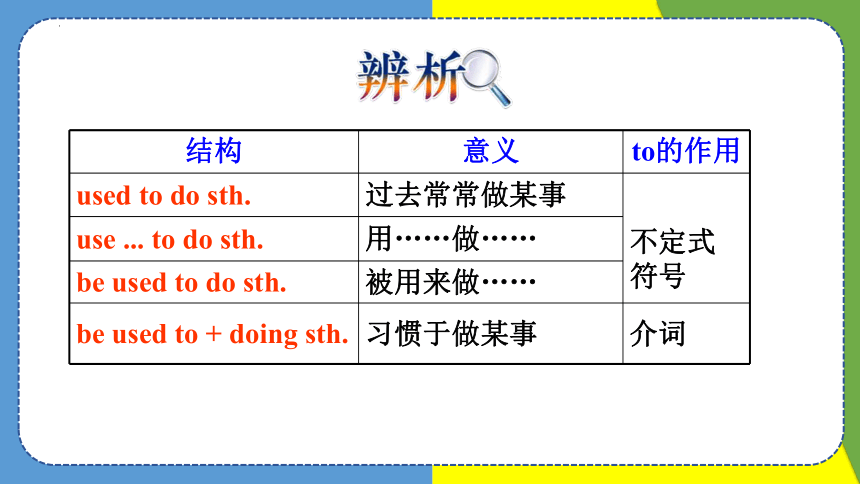
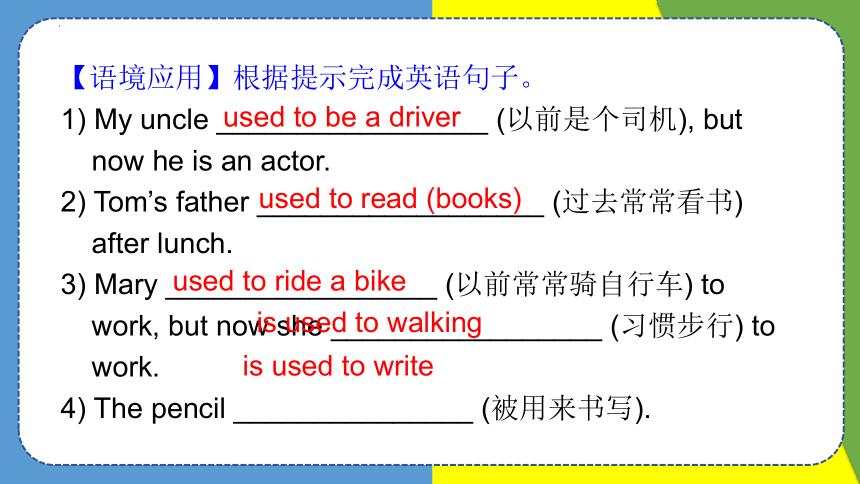
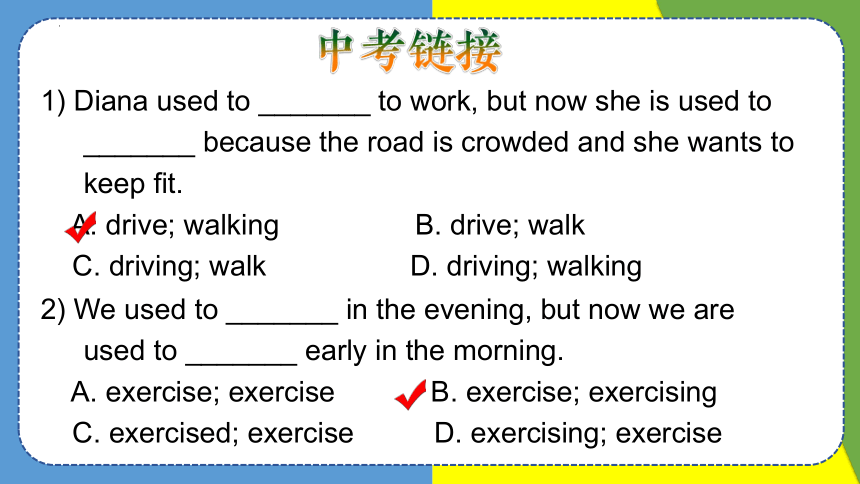
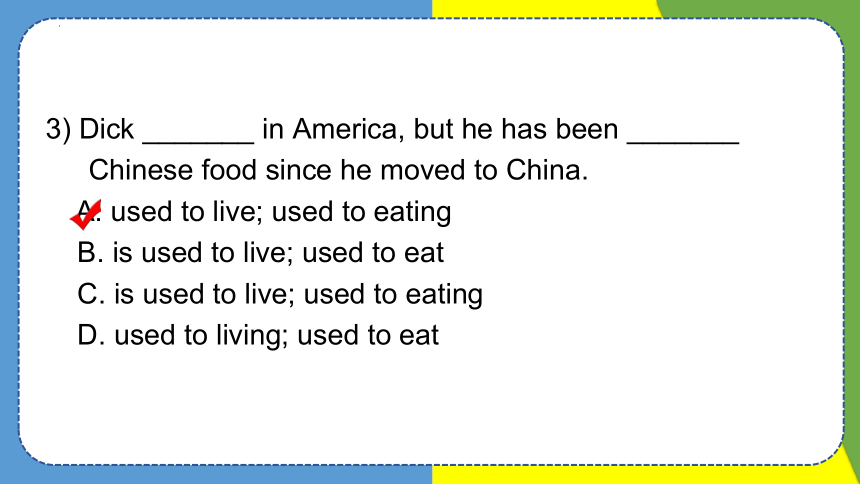
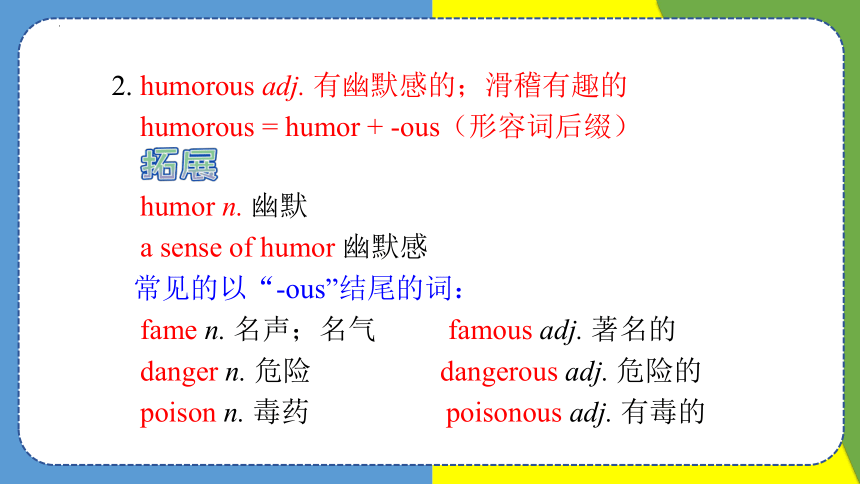
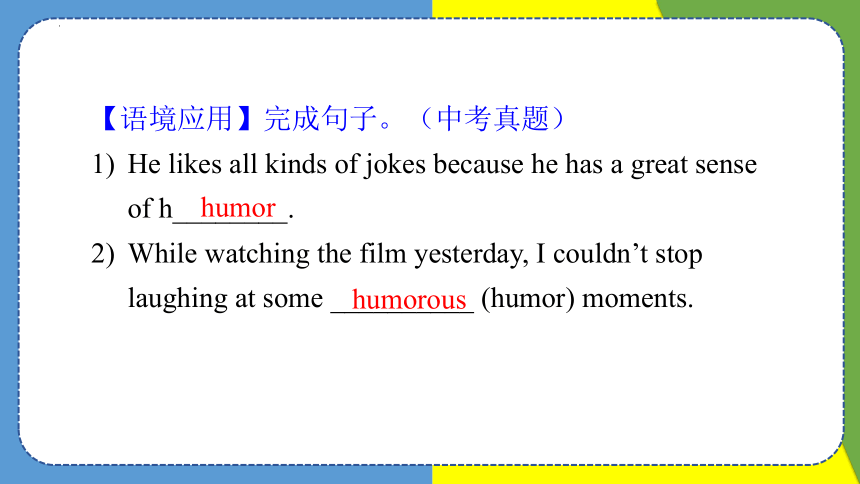
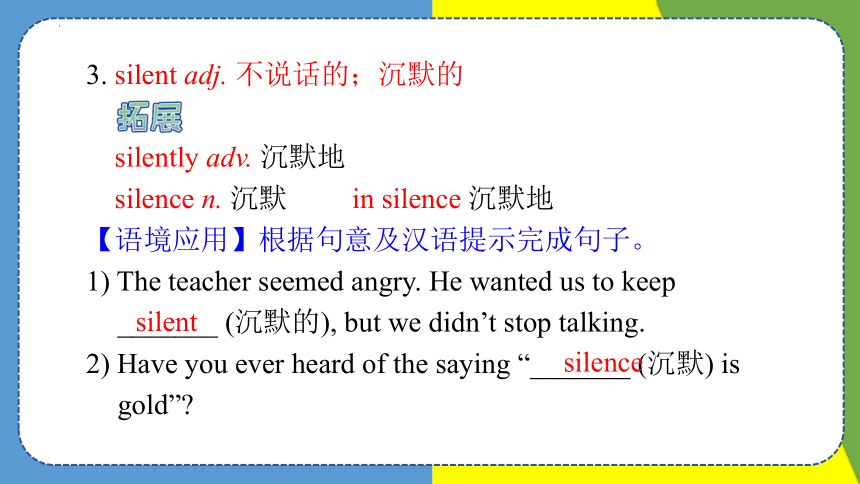
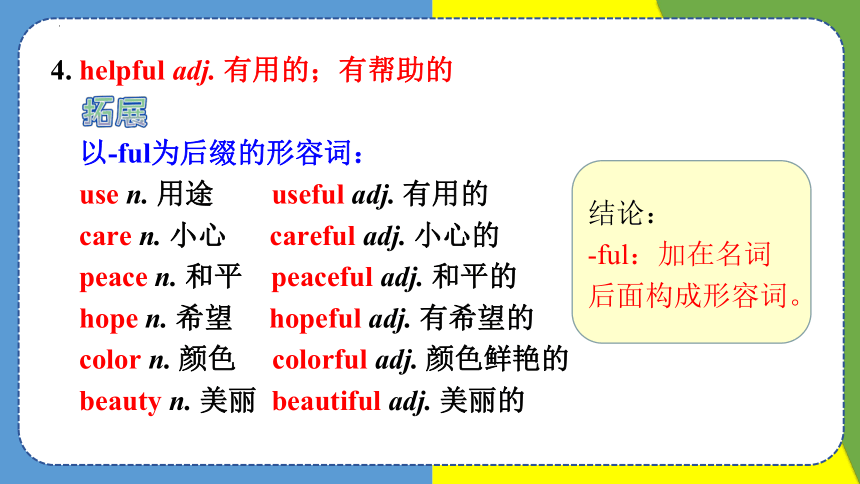
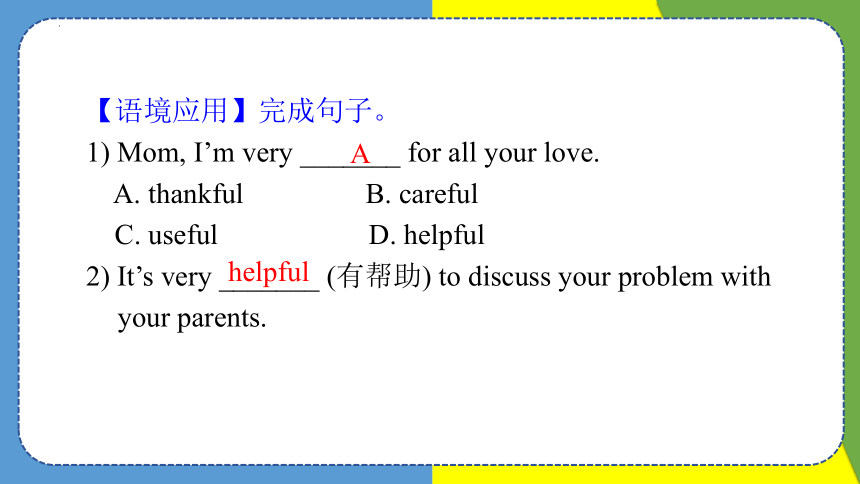
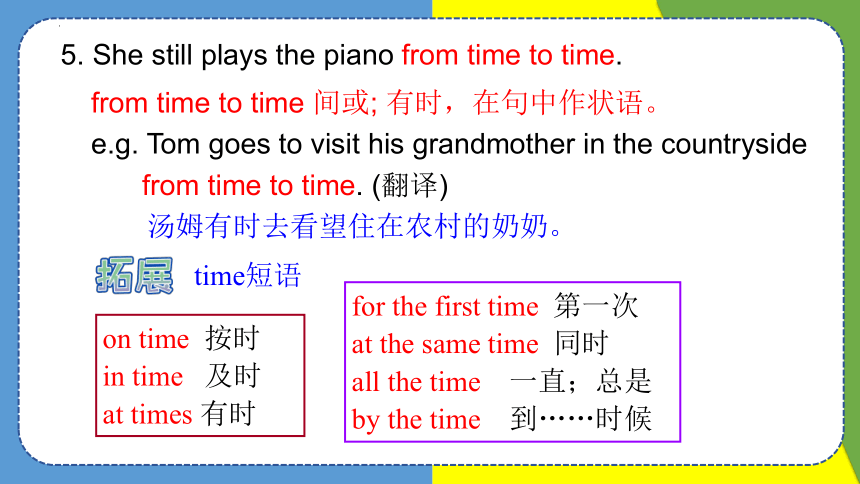
文档简介
(共45张PPT)
人教版 九年级上册
Unit 4
I used to be afraid of the dark.
核心考点精讲精练
1. I used to be afraid of the dark.
used to + 动词原形 “过去经常; 以前常常”(表示过去的习惯性动作或经常性状态,暗含现在可能不这样了)
e.g. Amy used to listen to music.
You used to be short, but now you’re tall.
否定句形式:didn’t use to
疑问句形式:可借助助动词did
e.g. The Whites didn’t use to live here.
Did you use to spend much time playing computer games
结构 意义 to的作用
used to do sth. 过去常常做某事
不定式符号
use ... to do sth. 用……做…… be used to do sth. 被用来做…… be used to + doing sth. 习惯于做某事 介词
【语境应用】根据提示完成英语句子。
1) My uncle _________________ (以前是个司机), but now he is an actor.
2) Tom’s father __________________ (过去常常看书) after lunch.
3) Mary _________________ (以前常常骑自行车) to work, but now she _________________ (习惯步行) to work.
4) The pencil _______________ (被用来书写).
used to be a driver
used to read (books)
used to ride a bike
is used to walking
is used to write
1) Diana used to _______ to work, but now she is used to _______ because the road is crowded and she wants to keep fit.
A. drive; walking B. drive; walk
C. driving; walk D. driving; walking
2) We used to _______ in the evening, but now we are used to _______ early in the morning.
A. exercise; exercise B. exercise; exercising
C. exercised; exercise D. exercising; exercise
3) Dick _______ in America, but he has been _______ Chinese food since he moved to China.
A. used to live; used to eating
B. is used to live; used to eat
C. is used to live; used to eating
D. used to living; used to eat
2. humorous adj. 有幽默感的;滑稽有趣的
humorous = humor + -ous(形容词后缀)
humor n. 幽默
a sense of humor 幽默感
常见的以“-ous”结尾的词:
fame n. 名声;名气 famous adj. 著名的
danger n. 危险 dangerous adj. 危险的
poison n. 毒药 poisonous adj. 有毒的
【语境应用】完成句子。(中考真题)
He likes all kinds of jokes because he has a great sense of h________.
While watching the film yesterday, I couldn’t stop laughing at some __________ (humor) moments.
humorous
humor
3. silent adj. 不说话的;沉默的
silently adv. 沉默地
silence n. 沉默 in silence 沉默地
【语境应用】根据句意及汉语提示完成句子。
1) The teacher seemed angry. He wanted us to keep _______ (沉默的), but we didn’t stop talking.
2) Have you ever heard of the saying “_______ (沉默) is gold”
silent
silence
4. helpful adj. 有用的;有帮助的
以-ful为后缀的形容词:
use n. 用途 useful adj. 有用的
care n. 小心 careful adj. 小心的
peace n. 和平 peaceful adj. 和平的
hope n. 希望 hopeful adj. 有希望的
color n. 颜色 colorful adj. 颜色鲜艳的
beauty n. 美丽 beautiful adj. 美丽的
结论:
-ful:加在名词后面构成形容词。
【语境应用】完成句子。
1) Mom, I’m very _______ for all your love.
A. thankful B. careful
C. useful D. helpful
2) It’s very _______ (有帮助) to discuss your problem with your parents.
A
helpful
5. She still plays the piano from time to time.
from time to time 间或; 有时,在句中作状语。
e.g. Tom goes to visit his grandmother in the countryside from time to time. (翻译)
汤姆有时去看望住在农村的奶奶。
for the first time 第一次
at the same time 同时
all the time 一直;总是
by the time 到……时候
time短语
on time 按时
in time 及时
at times 有时
【语境应用】
1) I met Mike in the library at times. (同义转换)
I met Mike in the library _______________.
from time to time
2) —Excuse me, will the flight arrive soon
—Yes. It will be landing right _____.
A. at times B. in time C. on time
C
such与so
such adj. 这(那)样的, 多修饰名词;
so adv. 这(那)么; 如此地, 主要修饰形容词或副词。
6. This party is such a great idea!
Billy has changed so much! He used to be so shy and quiet.
e.g. Do you like such weather
I’m so glad to see you.
He can draw so well.
1) 当名词前有表示数量的词, 如many, much, few或little等修饰时, 要用so而不用such。
e.g. There are so many / few people in the hall.
大厅有这么多/这么少的人。
2) such + a / an + 形容词 + 可数名词单数
= so + 形容词 + a / an + 可数名词单数, 如此……的一个……
e.g. She is such a lovely girl.
= She is so lovely a girl. 她是如此可爱的一个女孩。
【语境应用】用such或so填空。
1) The man told us _____ funny a story.
2) She has _____ a beautiful dress.
3) How can you get _____ much money to buy the car
4) Don’t go out in ______ cold weather.
5) Don’t eat _____ quickly.
so
such
so
such
so
7. It’s been three years since we last saw our primary school classmates.
It’s (It has) been + 时间段 + since从句,表示某事于过去某一时间开始,并且现在仍在继续 since从句多用一般过去时
【语境应用】翻译句子。
1) 他们已经离开很久了。
2) 我爷爷去世已有两年了。
It has been / is a long time since they left.
It has been / is two years since my grandpa died.
【注意】英国英语常用 it is + 时间段 + since …
8. I used to see him reading in the library every day.
see sb. doing sth. 看见某人正在做某事
强调看到事情正在发生
e.g.
I saw Mary cleaning the classroom when I passed by.
see sb. do sth. 看见某人做某事
强调看到事情发生的整个过程
e.g.
I saw Mr. Brown walk into his office.
【语境应用】单项选择。
1) When I walked past the park, I saw some old people ______ Chinese Taichi.
A. do B. did C. doing D. are doing
2) She is not in now. I saw her _______ to the library just now.
A. went B. goes C. go D. to go
e.g. He got high scores in the examination.
考试中他得了高分。
What’s the score 比分是多少?
score v. 进球;给……评分,打分
e.g. She usually scores highly in language exams.
在语言考试中,她通常得高分。
9. He studied hard and got good scores on his exams.
score n. (学生考试的) 分数; (比赛的)得分; 比分
in public 公开地; 在别人(尤指生人)面前
in person 亲身;亲自
in surprise 惊讶地
in fact 其实;事实上
in silence 沉默;无声
in trouble 处于困境中
in danger 处于危险中
“in + n.” 短语
e.g. I don’t like making speeches in public.
【语境应用】
—How strange! You sit in your room _______ for a long time, Li Ming.
—I just want to be quiet for a while. I’m sorry, Dad. I failed the test again.
(2019 湖北襄阳)
A. in silence B. in person
C. in public D. in fact
A
1. This party is such a great idea!
such
so
形容词 such+ a/an+adj.+n.(单)
such+adj.+n.(复数)/不可数n.
副词 so+ adj./adv.
so+adj.+a/an+n.(单数) so+many/much/few/little(少)+(n)
e.g. She is such a lovely girl.
= She is so lovely a girl.
You have so much / little homework today.
你今天有这么多/这么少的作业。
她是如此可爱的女孩。
用such或so填空。
1) The man told us ____ funny a story.
2) She has _____ a beautiful dress.
3) How can you get ____ much money to buy the car
4) Don’t go out in ______ cold weather.
5) Don’t eat _____ quickly.
so
such
so
such
so
即时演练:
2. It's been three years since we last saw our primary school classmates.
我们已经有三年没见到我们的小学同学了。
常用句型:
1)It has been + 一段时间 + since + 从句 (一般过去时)
eg: It has been two years since we came here.
2)一段时间+ has passed + since + 从句 (一般过去时)
eg: Two years has passed since we came here.
“It’s (It has) been + 时间段 + since从句”是英语中常见的句式,表示“自从……以来有多长时间了”,从句用一般过去时。
Language points
I interviewed 19-year-old Asian pop star ...
interview在此处作动词,意为“采访;面试”。interview也可作名词,意为“面试;访谈”。
Asian 在此处作形容词,意为“亚洲的”。除此之外,Asian作形容词还可意为“亚洲人的”。Asian还可作可数名词,意为“亚洲人”。
【活学活用】1) 我们正在采访艺术节的学生。 ______________________________________
2) 有多少个亚洲国家参加了运动会?
______________________________________
We are interviewing some students for the coming art festival.
How many Asian countries have taken part in the sports meeting
Candy told me that she used to be really shy and took up singing to deal with her shyness.
take up 开始;从事;接纳;占据;继续做
take up doing sth. 开始干某事
deal with 意为“对付;处理, 常与how连用, 强调处理问题的方式、方法。do with常与 what 连用, 侧重于对某事物的利用。
【活学活用】1) 他辞去城里的工作,开始务农。 ______________________________________
2) 我不知道他们如何处理这个问题。
______________________________________
He left the job in the city to take up farming.
I don’t know how they deal with the problem.
= I don’t know what they do with the problem.
deal with 此外还有“讨论; 与…交易”的意思。
I have a matter of importance to deal with.我有要事要处理。
Have you got any good idea about how to deal with this difficulty
处理这种困难你有什么好想法吗?
When I worked in Florida, I dealt with British people all the time.
在佛罗里达工作时, 我一直与英国人有生意往来。
【活学活用】
— ________ did you ________ your pocket money
— I sent it to the children in Sichuan.
A. What; deal with B. How; do to
C. What; deal to D. How; deal with
D
As she got better, she dared to sing in front of her class, and then for the whole school.
dare dare用作实义动词时,有时态和人称的变化,用do、does或did来构成否定句或疑问句。此处用作及物动词,意为“敢于;胆敢”。常构成短语dare to do sth. 意为“敢于做某事”。
whole 形容词,意为“整个的;全部的”,常用结“the+whole+单数名词”。all也有此意,all用于冠词、所有格或其他限定词之前;whole用于冠词、所有格及其他限定词之后
【活学活用】1) 他不敢正眼看她。 ______________________________________
2) 我的一生 ______________________________________
He didn't dare to look at her in the eye.
all my life/my whole life
dare用作情态动词, 一般用于疑问句、否定句或条件句, 或与 hardly, never, no one, nobody 等连用。有时态变化,但没有人称形式的变化, 其后接动词原形。构成疑问句和否定句时不用助动词do
I don't know whether he dare try.
我不知道他是否敢试一试。
How dare you ask me such a question
你怎敢问我这样的问题
【活学活用】
I _______ you because I thought I must be wrong.
A. dare not ask B. dare not to ask
C. dare not asking D. dare to not ask
A
“Well,” she begins slowly, “you have to be prepared to give up your normal life.
prepare 在此处用作及物动词,意为“准备;预备”。 常用搭配:
prepare sth. “准备某物”。
prepare sb sth. 表示“给某人准备某物”也可用prepare sth for sb.
prepare sb. for sth 表示“使某人对所准备”
prepare to do sth. 表示“准备做某事”。
【活学活用】
1) 她给我们准备了可口的早餐。 ____________________________________
2) 他们正准备过河,这时突然下雨了。______________________________________
She prepared us a nice breakfast.
= She prepared a nice breakfast for us.
They were preparing to cross the river when it began to rain.
give up意为“放弃”, 后面可以接名词或动词-ing形式作宾语。
give up是动副短语, 如果宾语是名词, 既可以将其放在give与up的中间, 也可以放在give up的后面。如果宾语是代词, 则必须将其放在give与up之间。
I wish I could give up drinking. 我真希望自己能戒酒。
We won’t give up this project. = We won’t give this project up.
我们不会放弃这项工程。
Don’t give him up.不要放弃他。
【活学活用】
You should really ______ smoking. It's a terrible habit.
A. grow up B. pick up
C. give up D. set up
C
… because there are always guards around me.
guard在此处作可数名词,意为“警卫;看守”。the Guards指(英国和其他一些国家的)禁军,御林军,近卫军。
guard还可作及物动词,意为“守卫,保卫”。guard against sth. “防止/防范/提防某事”。
【活学活用】1) 他在一家公司做安保。______________________________________
2) 每天刷牙提防口腔疾病。______________________________________
He works as a security guard in a company.
Brush your teeth every day to guard against tooth diseases.
It is hard to believe that he used to have difficulties in school.
It is hard to believe that …是一个含有宾语从句的复合句。主句中it作形式主语,真正的主语是that引导的从句。
It is hard to believe that they finished so much work during such a short time. 在这么短的一段时间内他们完成了如此多的工作, 这令人难以相信。
Language points
When he was a little boy, he seldom caused any
problems, and his family spent a lot of time together.
seldom 作副词,意为“不常;很少”相当于hardly ever, 其反义词为often(经常)通常置于实义动词之前,助动词、系动词或情态动词之后。
She seldom goes out by herself. 她很少独自外出。
He is seldom late for school. 他上学很少迟到。
注 意:
1)seldom 具有否定意义,用于句首表示强调时,主谓要
部分倒装。
Seldom do I go shopping by tax, unless it’s raining.
除非下雨,我很少打车去购物。
2)seldom 用于反意疑问句时,附加问句不用否定词not。
They seldom come late, do they 他们很少迟到,对吗
He was absent from classes and failed his
examinations. 他翘课,并且考试不及格。
(l) be absent from …意为“缺席……此处用作形容词,意为“缺席;不在”。
A good student would not be absent from school.
好学生是不会逃课的。
拓展:absent 用作动词,意为“缺席;不参加”。
He absent himself from the meeting yesterday.
他昨天没有出席会议。
Finally, Li Wen’s parents made the decision to send him to a boarding school.
Finally 用作副词,意为“最后;终于”,其同义词组是 in the end, at last。在句中作状语通常位于句首、句末或实义动词之前,be动词、助动词或情态动词之后。
Finally they got to the village. 最后他们到达了那个村庄。
He worked out the math problem finally.
他终于解出了那道数学题。
辨析: finally, at last 与 in the end
finally: “最后”,只指一系列事物或论点的顺序,一般不带
感彩。
at last:有时可与finally互换,但往往用于一番拖延和曲折之
后,因而带有较浓厚的感彩,如“不耐烦、不
放心、不如愿”等。
in the end:“终于”可用于预测未来,finally和at last不能。
He tried many times, and finally succeeded.
他试验了很多次,最后成功。
At last I have obtained my wish. 我的愿望终于实现了。
(2) send…to…意为“把……送到……”
His parents sent him to Shanghai to study.
他的父母送他到上海学习。
拓展:send 的固定搭配
1)send up “发射;发出”
Man-made satellites have been sent up into space by many countries.
2)send away “解雇;开除”
The boss sent away Tom.
His mother was ill and he sent for the doctor.
She advised them to talk with their son in person.
班主任建议李文的父母亲自和她们的儿子谈谈。
(1)advise 用作及物动词,其宾语可以是名词、代词、动词-ing 形式,也可以是that从句。advise也可以接双宾语,其直接宾语可由名词、带疑问词的动词不定式或that/wh-从句充当。advise还可由动词不定式充当宾补的复合宾语。
advise的常用句型:
1)advise doing sth. 意为“建议做某事”
He advised leaving early.
2) advise sb. to do sth. 意为“建议某人做某事”
The doctor advised me to take a complete rest.
医生建议我彻底休息一下。
注意:advise后不能直接跟不定式作宾语。
3) advise sb. against doing sth. 意为“劝告某人不要做某事”,有时可与 advise sb. not to do sth.互换。
He advised her against going out at night.
=He advised her not to no out at night. 他劝她晚上不要出去。
4) advise sb. of sth.意为“通知或告知某人有某情况”
Please advise us oj the arrival of the goods.
货物到达时请通知我们。
(2) in person意为“亲身;亲自”
You should come here in person tomorrow.
明天你应该亲自来这儿。
“…, they are always thinking of me. They take pride in everything good that I do.”
他们一直牵挂我,并为我所做的每一件好事感到自豪。
(1) be always doing sth.意为“总是做某事,一直做某事”,always常用在一般现在时态里,表示经常的行为习惯。当与进行时连用,构成句型“be always doing sth.”时,常表达说话人的某种情绪,如赞扬、不满、责备等。
He always asking his parents for money.
他总是向他的父母要钱。
She is always thinking of her work. 她总是想着自己的工作。
( 2 ) take pride in“为……感到自豪/骄傲,与be
proud of 同义。后接让人引以为荣的对象,其中pride为抽象名词,意为 “自豪;骄傲”,in 为介词,后接名词、代词或动名词作宾语。
The young mother took pride in her son.
=The young mother was proud of her son.
这个年轻的妈妈为她的儿子感到自豪。
人教版 九年级上册
Unit 4
I used to be afraid of the dark.
核心考点精讲精练
1. I used to be afraid of the dark.
used to + 动词原形 “过去经常; 以前常常”(表示过去的习惯性动作或经常性状态,暗含现在可能不这样了)
e.g. Amy used to listen to music.
You used to be short, but now you’re tall.
否定句形式:didn’t use to
疑问句形式:可借助助动词did
e.g. The Whites didn’t use to live here.
Did you use to spend much time playing computer games
结构 意义 to的作用
used to do sth. 过去常常做某事
不定式符号
use ... to do sth. 用……做…… be used to do sth. 被用来做…… be used to + doing sth. 习惯于做某事 介词
【语境应用】根据提示完成英语句子。
1) My uncle _________________ (以前是个司机), but now he is an actor.
2) Tom’s father __________________ (过去常常看书) after lunch.
3) Mary _________________ (以前常常骑自行车) to work, but now she _________________ (习惯步行) to work.
4) The pencil _______________ (被用来书写).
used to be a driver
used to read (books)
used to ride a bike
is used to walking
is used to write
1) Diana used to _______ to work, but now she is used to _______ because the road is crowded and she wants to keep fit.
A. drive; walking B. drive; walk
C. driving; walk D. driving; walking
2) We used to _______ in the evening, but now we are used to _______ early in the morning.
A. exercise; exercise B. exercise; exercising
C. exercised; exercise D. exercising; exercise
3) Dick _______ in America, but he has been _______ Chinese food since he moved to China.
A. used to live; used to eating
B. is used to live; used to eat
C. is used to live; used to eating
D. used to living; used to eat
2. humorous adj. 有幽默感的;滑稽有趣的
humorous = humor + -ous(形容词后缀)
humor n. 幽默
a sense of humor 幽默感
常见的以“-ous”结尾的词:
fame n. 名声;名气 famous adj. 著名的
danger n. 危险 dangerous adj. 危险的
poison n. 毒药 poisonous adj. 有毒的
【语境应用】完成句子。(中考真题)
He likes all kinds of jokes because he has a great sense of h________.
While watching the film yesterday, I couldn’t stop laughing at some __________ (humor) moments.
humorous
humor
3. silent adj. 不说话的;沉默的
silently adv. 沉默地
silence n. 沉默 in silence 沉默地
【语境应用】根据句意及汉语提示完成句子。
1) The teacher seemed angry. He wanted us to keep _______ (沉默的), but we didn’t stop talking.
2) Have you ever heard of the saying “_______ (沉默) is gold”
silent
silence
4. helpful adj. 有用的;有帮助的
以-ful为后缀的形容词:
use n. 用途 useful adj. 有用的
care n. 小心 careful adj. 小心的
peace n. 和平 peaceful adj. 和平的
hope n. 希望 hopeful adj. 有希望的
color n. 颜色 colorful adj. 颜色鲜艳的
beauty n. 美丽 beautiful adj. 美丽的
结论:
-ful:加在名词后面构成形容词。
【语境应用】完成句子。
1) Mom, I’m very _______ for all your love.
A. thankful B. careful
C. useful D. helpful
2) It’s very _______ (有帮助) to discuss your problem with your parents.
A
helpful
5. She still plays the piano from time to time.
from time to time 间或; 有时,在句中作状语。
e.g. Tom goes to visit his grandmother in the countryside from time to time. (翻译)
汤姆有时去看望住在农村的奶奶。
for the first time 第一次
at the same time 同时
all the time 一直;总是
by the time 到……时候
time短语
on time 按时
in time 及时
at times 有时
【语境应用】
1) I met Mike in the library at times. (同义转换)
I met Mike in the library _______________.
from time to time
2) —Excuse me, will the flight arrive soon
—Yes. It will be landing right _____.
A. at times B. in time C. on time
C
such与so
such adj. 这(那)样的, 多修饰名词;
so adv. 这(那)么; 如此地, 主要修饰形容词或副词。
6. This party is such a great idea!
Billy has changed so much! He used to be so shy and quiet.
e.g. Do you like such weather
I’m so glad to see you.
He can draw so well.
1) 当名词前有表示数量的词, 如many, much, few或little等修饰时, 要用so而不用such。
e.g. There are so many / few people in the hall.
大厅有这么多/这么少的人。
2) such + a / an + 形容词 + 可数名词单数
= so + 形容词 + a / an + 可数名词单数, 如此……的一个……
e.g. She is such a lovely girl.
= She is so lovely a girl. 她是如此可爱的一个女孩。
【语境应用】用such或so填空。
1) The man told us _____ funny a story.
2) She has _____ a beautiful dress.
3) How can you get _____ much money to buy the car
4) Don’t go out in ______ cold weather.
5) Don’t eat _____ quickly.
so
such
so
such
so
7. It’s been three years since we last saw our primary school classmates.
It’s (It has) been + 时间段 + since从句,表示某事于过去某一时间开始,并且现在仍在继续 since从句多用一般过去时
【语境应用】翻译句子。
1) 他们已经离开很久了。
2) 我爷爷去世已有两年了。
It has been / is a long time since they left.
It has been / is two years since my grandpa died.
【注意】英国英语常用 it is + 时间段 + since …
8. I used to see him reading in the library every day.
see sb. doing sth. 看见某人正在做某事
强调看到事情正在发生
e.g.
I saw Mary cleaning the classroom when I passed by.
see sb. do sth. 看见某人做某事
强调看到事情发生的整个过程
e.g.
I saw Mr. Brown walk into his office.
【语境应用】单项选择。
1) When I walked past the park, I saw some old people ______ Chinese Taichi.
A. do B. did C. doing D. are doing
2) She is not in now. I saw her _______ to the library just now.
A. went B. goes C. go D. to go
e.g. He got high scores in the examination.
考试中他得了高分。
What’s the score 比分是多少?
score v. 进球;给……评分,打分
e.g. She usually scores highly in language exams.
在语言考试中,她通常得高分。
9. He studied hard and got good scores on his exams.
score n. (学生考试的) 分数; (比赛的)得分; 比分
in public 公开地; 在别人(尤指生人)面前
in person 亲身;亲自
in surprise 惊讶地
in fact 其实;事实上
in silence 沉默;无声
in trouble 处于困境中
in danger 处于危险中
“in + n.” 短语
e.g. I don’t like making speeches in public.
【语境应用】
—How strange! You sit in your room _______ for a long time, Li Ming.
—I just want to be quiet for a while. I’m sorry, Dad. I failed the test again.
(2019 湖北襄阳)
A. in silence B. in person
C. in public D. in fact
A
1. This party is such a great idea!
such
so
形容词 such+ a/an+adj.+n.(单)
such+adj.+n.(复数)/不可数n.
副词 so+ adj./adv.
so+adj.+a/an+n.(单数) so+many/much/few/little(少)+(n)
e.g. She is such a lovely girl.
= She is so lovely a girl.
You have so much / little homework today.
你今天有这么多/这么少的作业。
她是如此可爱的女孩。
用such或so填空。
1) The man told us ____ funny a story.
2) She has _____ a beautiful dress.
3) How can you get ____ much money to buy the car
4) Don’t go out in ______ cold weather.
5) Don’t eat _____ quickly.
so
such
so
such
so
即时演练:
2. It's been three years since we last saw our primary school classmates.
我们已经有三年没见到我们的小学同学了。
常用句型:
1)It has been + 一段时间 + since + 从句 (一般过去时)
eg: It has been two years since we came here.
2)一段时间+ has passed + since + 从句 (一般过去时)
eg: Two years has passed since we came here.
“It’s (It has) been + 时间段 + since从句”是英语中常见的句式,表示“自从……以来有多长时间了”,从句用一般过去时。
Language points
I interviewed 19-year-old Asian pop star ...
interview在此处作动词,意为“采访;面试”。interview也可作名词,意为“面试;访谈”。
Asian 在此处作形容词,意为“亚洲的”。除此之外,Asian作形容词还可意为“亚洲人的”。Asian还可作可数名词,意为“亚洲人”。
【活学活用】1) 我们正在采访艺术节的学生。 ______________________________________
2) 有多少个亚洲国家参加了运动会?
______________________________________
We are interviewing some students for the coming art festival.
How many Asian countries have taken part in the sports meeting
Candy told me that she used to be really shy and took up singing to deal with her shyness.
take up 开始;从事;接纳;占据;继续做
take up doing sth. 开始干某事
deal with 意为“对付;处理, 常与how连用, 强调处理问题的方式、方法。do with常与 what 连用, 侧重于对某事物的利用。
【活学活用】1) 他辞去城里的工作,开始务农。 ______________________________________
2) 我不知道他们如何处理这个问题。
______________________________________
He left the job in the city to take up farming.
I don’t know how they deal with the problem.
= I don’t know what they do with the problem.
deal with 此外还有“讨论; 与…交易”的意思。
I have a matter of importance to deal with.我有要事要处理。
Have you got any good idea about how to deal with this difficulty
处理这种困难你有什么好想法吗?
When I worked in Florida, I dealt with British people all the time.
在佛罗里达工作时, 我一直与英国人有生意往来。
【活学活用】
— ________ did you ________ your pocket money
— I sent it to the children in Sichuan.
A. What; deal with B. How; do to
C. What; deal to D. How; deal with
D
As she got better, she dared to sing in front of her class, and then for the whole school.
dare dare用作实义动词时,有时态和人称的变化,用do、does或did来构成否定句或疑问句。此处用作及物动词,意为“敢于;胆敢”。常构成短语dare to do sth. 意为“敢于做某事”。
whole 形容词,意为“整个的;全部的”,常用结“the+whole+单数名词”。all也有此意,all用于冠词、所有格或其他限定词之前;whole用于冠词、所有格及其他限定词之后
【活学活用】1) 他不敢正眼看她。 ______________________________________
2) 我的一生 ______________________________________
He didn't dare to look at her in the eye.
all my life/my whole life
dare用作情态动词, 一般用于疑问句、否定句或条件句, 或与 hardly, never, no one, nobody 等连用。有时态变化,但没有人称形式的变化, 其后接动词原形。构成疑问句和否定句时不用助动词do
I don't know whether he dare try.
我不知道他是否敢试一试。
How dare you ask me such a question
你怎敢问我这样的问题
【活学活用】
I _______ you because I thought I must be wrong.
A. dare not ask B. dare not to ask
C. dare not asking D. dare to not ask
A
“Well,” she begins slowly, “you have to be prepared to give up your normal life.
prepare 在此处用作及物动词,意为“准备;预备”。 常用搭配:
prepare sth. “准备某物”。
prepare sb sth. 表示“给某人准备某物”也可用prepare sth for sb.
prepare sb. for sth 表示“使某人对所准备”
prepare to do sth. 表示“准备做某事”。
【活学活用】
1) 她给我们准备了可口的早餐。 ____________________________________
2) 他们正准备过河,这时突然下雨了。______________________________________
She prepared us a nice breakfast.
= She prepared a nice breakfast for us.
They were preparing to cross the river when it began to rain.
give up意为“放弃”, 后面可以接名词或动词-ing形式作宾语。
give up是动副短语, 如果宾语是名词, 既可以将其放在give与up的中间, 也可以放在give up的后面。如果宾语是代词, 则必须将其放在give与up之间。
I wish I could give up drinking. 我真希望自己能戒酒。
We won’t give up this project. = We won’t give this project up.
我们不会放弃这项工程。
Don’t give him up.不要放弃他。
【活学活用】
You should really ______ smoking. It's a terrible habit.
A. grow up B. pick up
C. give up D. set up
C
… because there are always guards around me.
guard在此处作可数名词,意为“警卫;看守”。the Guards指(英国和其他一些国家的)禁军,御林军,近卫军。
guard还可作及物动词,意为“守卫,保卫”。guard against sth. “防止/防范/提防某事”。
【活学活用】1) 他在一家公司做安保。______________________________________
2) 每天刷牙提防口腔疾病。______________________________________
He works as a security guard in a company.
Brush your teeth every day to guard against tooth diseases.
It is hard to believe that he used to have difficulties in school.
It is hard to believe that …是一个含有宾语从句的复合句。主句中it作形式主语,真正的主语是that引导的从句。
It is hard to believe that they finished so much work during such a short time. 在这么短的一段时间内他们完成了如此多的工作, 这令人难以相信。
Language points
When he was a little boy, he seldom caused any
problems, and his family spent a lot of time together.
seldom 作副词,意为“不常;很少”相当于hardly ever, 其反义词为often(经常)通常置于实义动词之前,助动词、系动词或情态动词之后。
She seldom goes out by herself. 她很少独自外出。
He is seldom late for school. 他上学很少迟到。
注 意:
1)seldom 具有否定意义,用于句首表示强调时,主谓要
部分倒装。
Seldom do I go shopping by tax, unless it’s raining.
除非下雨,我很少打车去购物。
2)seldom 用于反意疑问句时,附加问句不用否定词not。
They seldom come late, do they 他们很少迟到,对吗
He was absent from classes and failed his
examinations. 他翘课,并且考试不及格。
(l) be absent from …意为“缺席……此处用作形容词,意为“缺席;不在”。
A good student would not be absent from school.
好学生是不会逃课的。
拓展:absent 用作动词,意为“缺席;不参加”。
He absent himself from the meeting yesterday.
他昨天没有出席会议。
Finally, Li Wen’s parents made the decision to send him to a boarding school.
Finally 用作副词,意为“最后;终于”,其同义词组是 in the end, at last。在句中作状语通常位于句首、句末或实义动词之前,be动词、助动词或情态动词之后。
Finally they got to the village. 最后他们到达了那个村庄。
He worked out the math problem finally.
他终于解出了那道数学题。
辨析: finally, at last 与 in the end
finally: “最后”,只指一系列事物或论点的顺序,一般不带
感彩。
at last:有时可与finally互换,但往往用于一番拖延和曲折之
后,因而带有较浓厚的感彩,如“不耐烦、不
放心、不如愿”等。
in the end:“终于”可用于预测未来,finally和at last不能。
He tried many times, and finally succeeded.
他试验了很多次,最后成功。
At last I have obtained my wish. 我的愿望终于实现了。
(2) send…to…意为“把……送到……”
His parents sent him to Shanghai to study.
他的父母送他到上海学习。
拓展:send 的固定搭配
1)send up “发射;发出”
Man-made satellites have been sent up into space by many countries.
2)send away “解雇;开除”
The boss sent away Tom.
His mother was ill and he sent for the doctor.
She advised them to talk with their son in person.
班主任建议李文的父母亲自和她们的儿子谈谈。
(1)advise 用作及物动词,其宾语可以是名词、代词、动词-ing 形式,也可以是that从句。advise也可以接双宾语,其直接宾语可由名词、带疑问词的动词不定式或that/wh-从句充当。advise还可由动词不定式充当宾补的复合宾语。
advise的常用句型:
1)advise doing sth. 意为“建议做某事”
He advised leaving early.
2) advise sb. to do sth. 意为“建议某人做某事”
The doctor advised me to take a complete rest.
医生建议我彻底休息一下。
注意:advise后不能直接跟不定式作宾语。
3) advise sb. against doing sth. 意为“劝告某人不要做某事”,有时可与 advise sb. not to do sth.互换。
He advised her against going out at night.
=He advised her not to no out at night. 他劝她晚上不要出去。
4) advise sb. of sth.意为“通知或告知某人有某情况”
Please advise us oj the arrival of the goods.
货物到达时请通知我们。
(2) in person意为“亲身;亲自”
You should come here in person tomorrow.
明天你应该亲自来这儿。
“…, they are always thinking of me. They take pride in everything good that I do.”
他们一直牵挂我,并为我所做的每一件好事感到自豪。
(1) be always doing sth.意为“总是做某事,一直做某事”,always常用在一般现在时态里,表示经常的行为习惯。当与进行时连用,构成句型“be always doing sth.”时,常表达说话人的某种情绪,如赞扬、不满、责备等。
He always asking his parents for money.
他总是向他的父母要钱。
She is always thinking of her work. 她总是想着自己的工作。
( 2 ) take pride in“为……感到自豪/骄傲,与be
proud of 同义。后接让人引以为荣的对象,其中pride为抽象名词,意为 “自豪;骄傲”,in 为介词,后接名词、代词或动名词作宾语。
The young mother took pride in her son.
=The young mother was proud of her son.
这个年轻的妈妈为她的儿子感到自豪。
同课章节目录
- Unit 1 How can we become good learners.
- Section A
- Section B
- Unit 2 I think that mooncakes are delicious!
- Section A
- Section B
- Unit 3 Could you please tell me where the restroom
- Section A
- Section B
- Unit 4 I used to be afraid of the dark.
- Section A
- Section B
- Unit 5 What are the shirts made of?
- Section A
- Section B
- Review of Units 1-5
- Unit 6 When was it invented?
- Section A
- Section B
- Unit 7 Teenagers should be allowed to choose their
- Section A
- Section B
- Unit 8 It must belong to Carla.
- Section A
- Section B
- Unit 9 I like music that I can dance to.
- Section A
- Section B
- Unit 10 You're supposed to shake hands.
- Section A
- Section B
- Review of Units 6-10
- Unit 11 Sad movies make me cry.
- Section A
- Section B
- Unit 12 Life is full of the unexpected
- Section A
- Section B
- Unit 13 We're trying to save the earth!
- Section A
- Section B
- Unit 14 I remember meeting all of you in Grade 7.
- Section A
- Section B
- Review of Units 11-14
